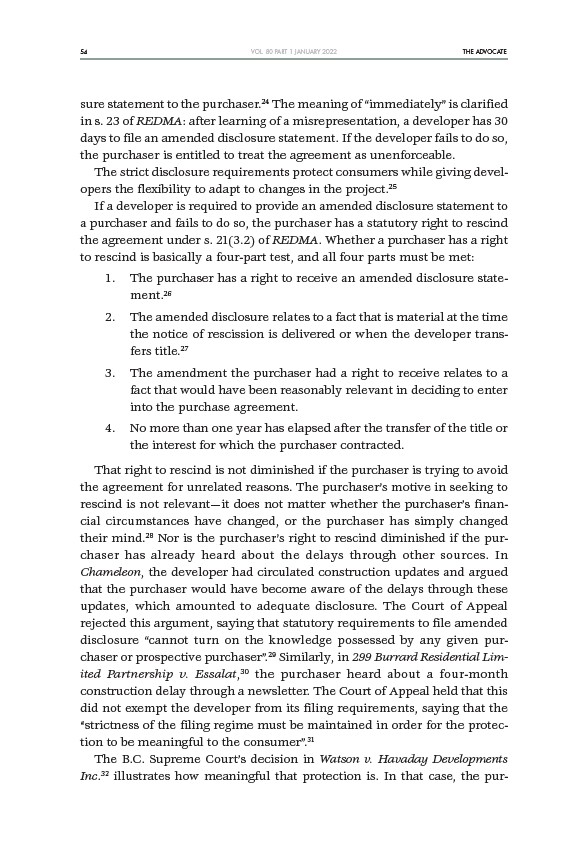
54 THE ADVOCATE
VOL. 80 PART 1 JANUARY 2022
sure statement to the purchaser.24 The meaning of “immediately” is clarified
in s. 23 of REDMA: after learning of a misrepresentation, a developer has 30
days to file an amended disclosure statement. If the developer fails to do so,
the purchaser is entitled to treat the agreement as unenforceable.
The strict disclosure requirements protect consumers while giving developers
the flexibility to adapt to changes in the project.25
If a developer is required to provide an amended disclosure statement to
a purchaser and fails to do so, the purchaser has a statutory right to rescind
the agreement under s. 21(3.2) of REDMA. Whether a purchaser has a right
to rescind is basically a four-part test, and all four parts must be met:
1. The purchaser has a right to receive an amended disclosure statement.
26
2. The amended disclosure relates to a fact that is material at the time
the notice of rescission is delivered or when the developer transfers
title.27
3. The amendment the purchaser had a right to receive relates to a
fact that would have been reasonably relevant in deciding to enter
into the purchase agreement.
4. No more than one year has elapsed after the transfer of the title or
the interest for which the purchaser contracted.
That right to rescind is not diminished if the purchaser is trying to avoid
the agreement for unrelated reasons. The purchaser’s motive in seeking to
rescind is not relevant—it does not matter whether the purchaser’s financial
circumstances have changed, or the purchaser has simply changed
their mind.28 Nor is the purchaser’s right to rescind diminished if the purchaser
has already heard about the delays through other sources. In
Chameleon, the developer had circulated construction updates and argued
that the purchaser would have become aware of the delays through these
updates, which amounted to adequate disclosure. The Court of Appeal
rejected this argument, saying that statutory requirements to file amended
disclosure “cannot turn on the knowledge possessed by any given purchaser
or prospective purchaser”.29 Similarly, in 299 Burrard Residential Limited
Partnership v. Essalat,30 the purchaser heard about a four-month
construction delay through a newsletter. The Court of Appeal held that this
did not exempt the developer from its filing requirements, saying that the
“strictness of the filing regime must be maintained in order for the protection
to be meaningful to the consumer”.31
The B.C. Supreme Court’s decision in Watson v. Havaday Developments
Inc.32 illustrates how meaningful that protection is. In that case, the pur-